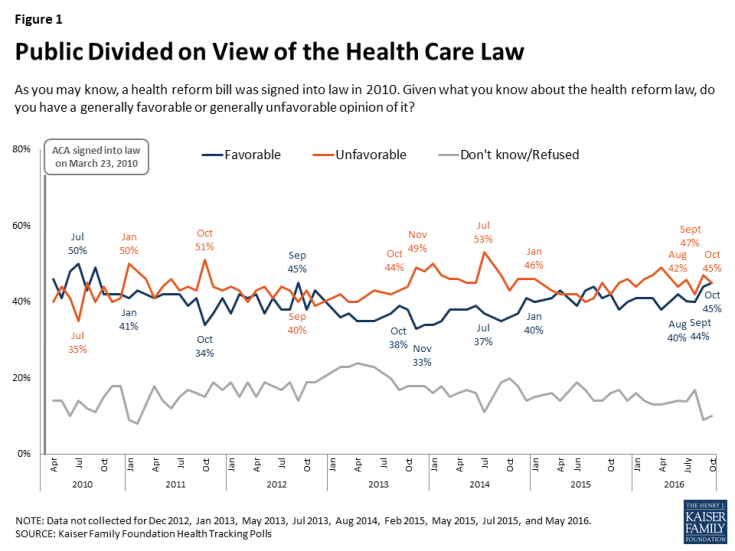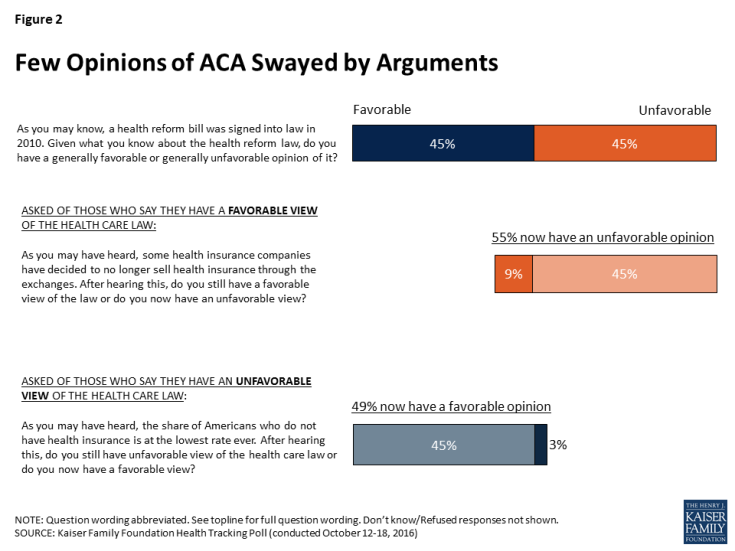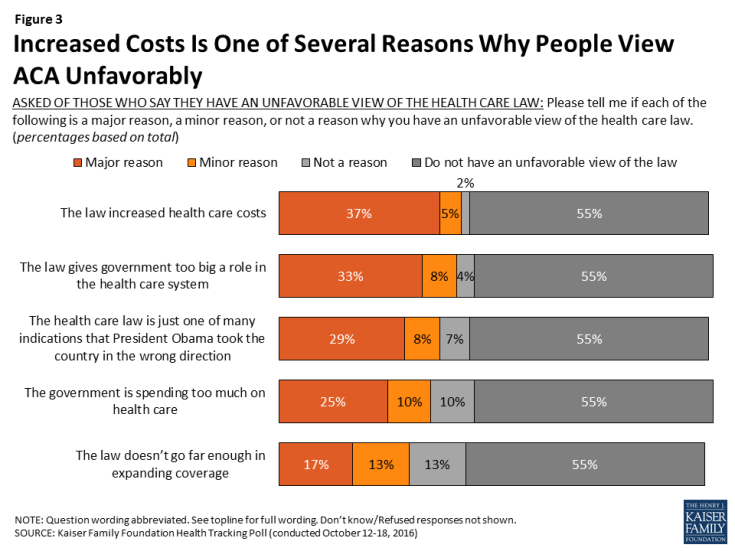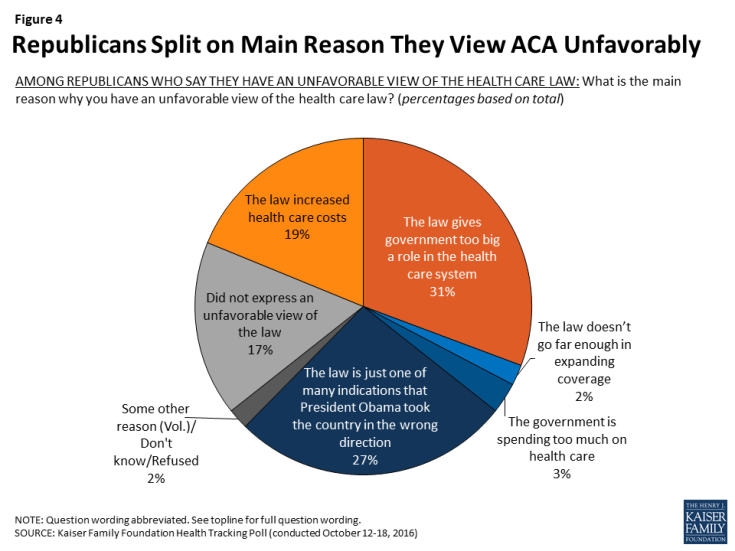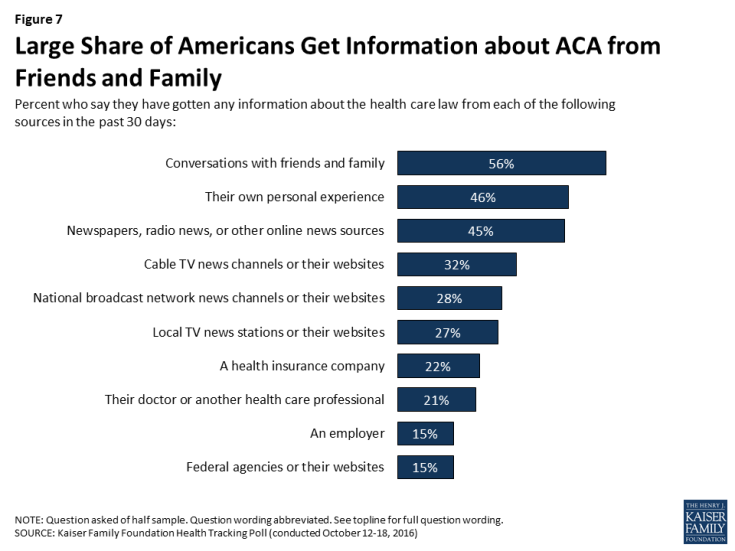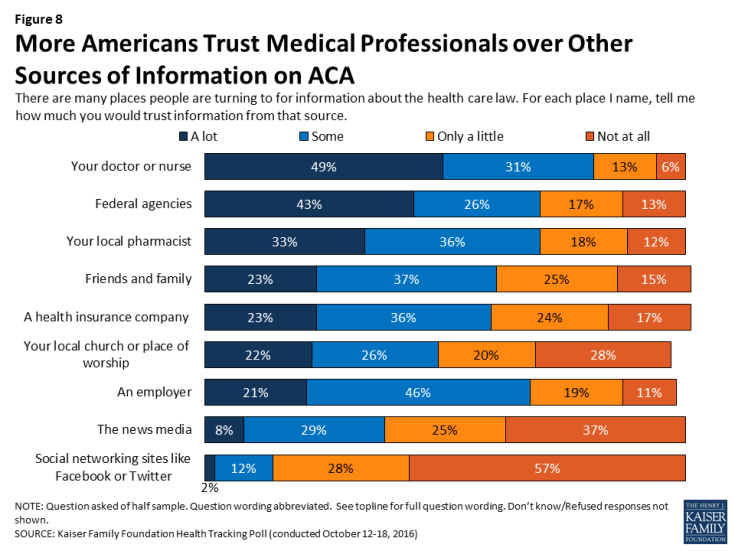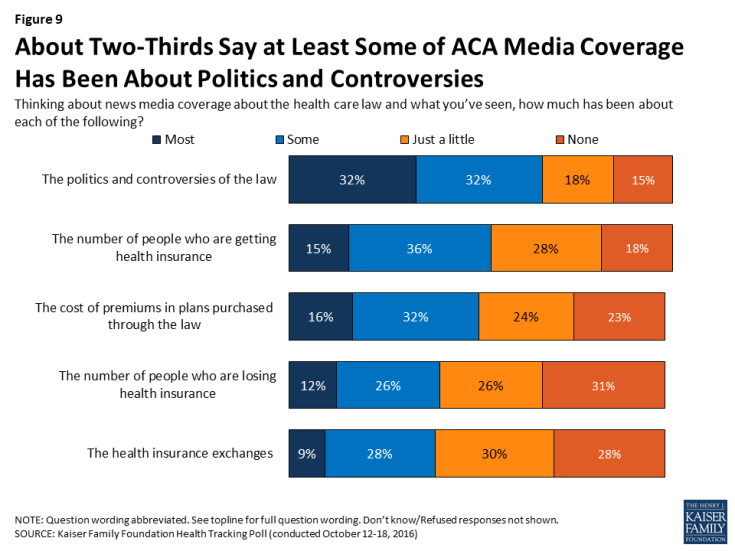Data Note: Americans’ Opinions of the Affordable Care Act
With the Affordable Care Act’s fourth open enrollment period beginning on November 1st, this Data Note examines the public’s view on the 2010 health care law, including which groups they think are better and worse off as a result of this legislation, and what sources they go to for information about the law. The findings illustrate that in the six years since its passage, Americans not only remain divided on their opinions of the health care law but also in their perceptions of how the legislation is affecting different groups. In addition, the majority of Americans say the news coverage about the health care law has focused on the politics and controversies of the law while fewer say the news coverage has been about different aspects of the law’s implementation.
The Future of the Affordable Care Act
The October Kaiser Health Tracking Poll finds Americans’ opinions of the health care law remain divided, with equal shares (45 percent) saying they have a favorable view as saying they have an unfavorable view. Partisans differ in their attitudes towards the health care law, with the majority of Democrats expressing a favorable view (76 percent) while the majority of Republicans express an unfavorable one (83 percent). Independents lean negative, with 38 percent expressing a favorable view and 52 percent expressing an unfavorable view.
Americans’ Opinions of the ACA Are Largely Stable, Unswayed by Arguments
More than six years since the passing of the ACA, it appears that most Americans have largely stable attitudes towards the law, with few being persuaded from their opinions after hearing arguments for or against it. For example, a relatively small share (9 percent, overall) shift their opinion from favorable to unfavorable after hearing that some health insurance companies have decided to no longer sell health insurance through the exchanges or marketplaces. On the other hand, an even smaller share (3 percent, overall) shift their opinion from unfavorable to favorable after hearing that the share of Americans who do not have health insurance is at the lowest rate ever.
Perceived Increase in Costs Among Reasons Why Individuals Have Unfavorable Opinions of the ACA
When individuals with an unfavorable view of the health care law are asked about a number of reasons why they dislike the law, a large share – nearly four in ten Americans overall – say a major reason is because they feel the law increased health care costs. This is closely followed by those who say their unfavorable view is because they believe the law gives government too big a role in the health care system (33 percent) or say that it is just one of many indications that President Obama took the country in the wrong direction (29 percent). One-fourth of Americans say a major reason why they have an unfavorable view of the health care law is because they believe the government is spending too much on health care. A smaller share of the public (17 percent) say a major reason why they view the law unfavorably is because the law doesn’t go far enough in expanding coverage. When asked the main reason for why they view the law unfavorably, similar shares say it is because the law gives government too big a role in the health care system (14 percent, overall) as say it is the law increased health care costs (11 percent) or say the health care law is just one of many indications that President Obama took the country in the wrong direction (12 percent).
Focusing specifically on Republicans, the vast majority of whom have an unfavorable view of the law, when asked the main reason why they have an unfavorable view of the health care law, about three in ten said it is because they believe the law gives government too big a role in the health care system (31 percent) or say it is just one of many indications that President Obama took the country in the wrong direction (27 percent).
Perceptions Vary in How ACA Is Impacting Populations
While many Americans perceive some of the key groups targeted by the ACA (lower-income people and the uninsured) as “better off” as a result of the health care law, the public is less positive on how other groups – including they, themselves – are faring. More of the public say that lower-income people (50 percent) and the uninsured (44 percent) are “better off” as a result of the health care law, than say they are “worse off” (32 percent, for both). This is in contrast with larger shares saying small employers and people who buy their own health insurance are “worse off” than say they are “better off.” Attitudes towards large employers, people who get health insurance through an employer, and the country as a whole are more mixed with similar shares thinking they are “better off” as “worse off.” When asked if they and their families are better or worse off as a result of the health care law, half say the law has not made much of a difference while 29 percent say they are “worse off” and 19 percent say they are “better off.”
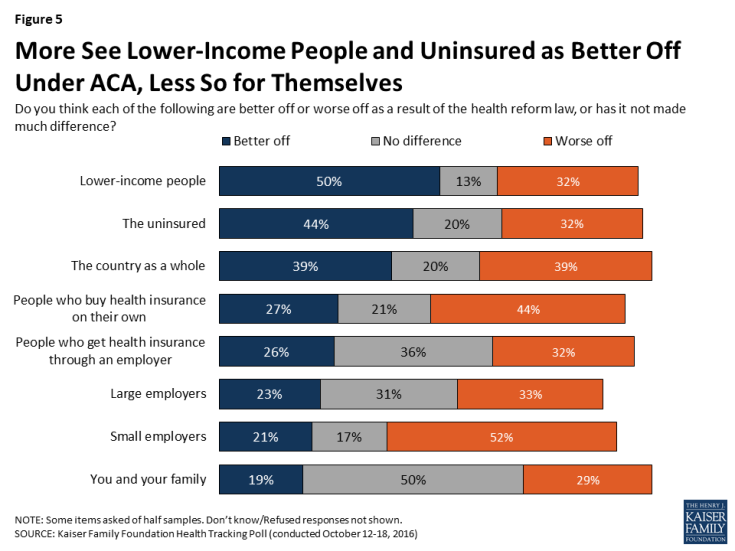
Figure 5: More See Lower-Income People and Uninsured as Better Off Under ACA, Less So for Themselves
Perceived impacts of the law are largely driven by partisanship, with larger shares of Democrats saying most of these groups are “better off” than independents or Republicans. For example, about one-third of Democrats (36 percent) say they and their family are “better off” as a result of the health care law compared to 13 percent of independents and 6 percent of Republicans. In addition, two-thirds (67 percent) of Democrats say the country as a whole is “better off” while this view is shared by 35 percent of independents and 9 percent of Republicans.
Sources of Recent Information About the ACA
More than half (56 percent) of the public say they have gotten information about the health care law in the past 30 days from conversations with friends and family. This is followed by nearly half who say they have gotten information from their own personal experiences (46 percent) or have gotten information from newspapers, radio, or other online news sources (45 percent). Fewer report getting information about the health care law from other types of media including cable TV news (32 percent), national broadcast network news (28 percent), and local TV news (27 percent). Less than one in four report getting information from a health insurance company (22 percent), their doctor or another health care professional (21 percent), an employer (15 percent), or a federal agency such as the Department of Health and Human Services (15 percent).
Which Sources Do People Trust?
While relatively few Americans report getting information about the health care law from doctors and nurses or federal agencies, these are the sources most of the public trusts for information on the health care law. About half (49 percent) of individuals report they would trust the information from doctors and nurses “a lot” while 43 percent say they trust information from federal agencies. This is followed by one-third who say they would trust information from their local pharmacist. About one in five Americans say they would trust information from their friends and family (23 percent), a health insurance company (23 percent), their local place of worship (22 percent), or an employer (21 percent). Finally, relatively small shares of the public say they would trust the information they get from the news media or social networking sites (8 percent and 2 percent, respectively).
Majority of Americans Say News Coverage of ACA Focuses on Politics and Controversies
Overall, two-thirds (64 percent) of Americans say the news coverage they’ve seen about the health care law has been about the politics and controversies of the law. About half (51 percent) of Americans say at least some of the coverage has been about the number of people who are getting health insurance, higher than the share that says at least some of the coverage has been about the number of people losing insurance (38 percent). Slightly less than half (47 percent) say at least some of the coverage has been about the cost of premiums in plans purchased through the law, and 38 percent say at least some coverage has been about the health insurance exchanges.

